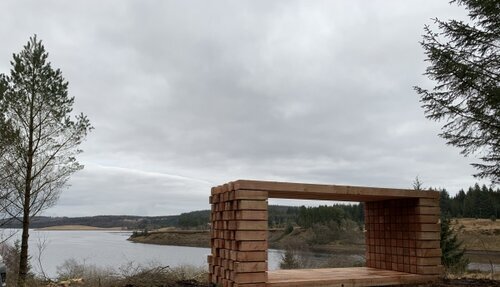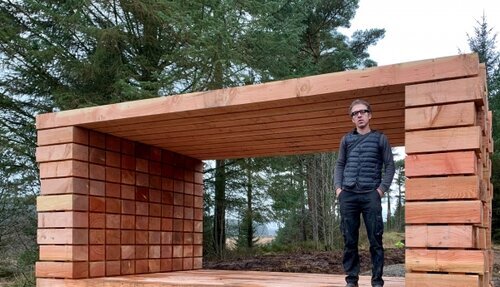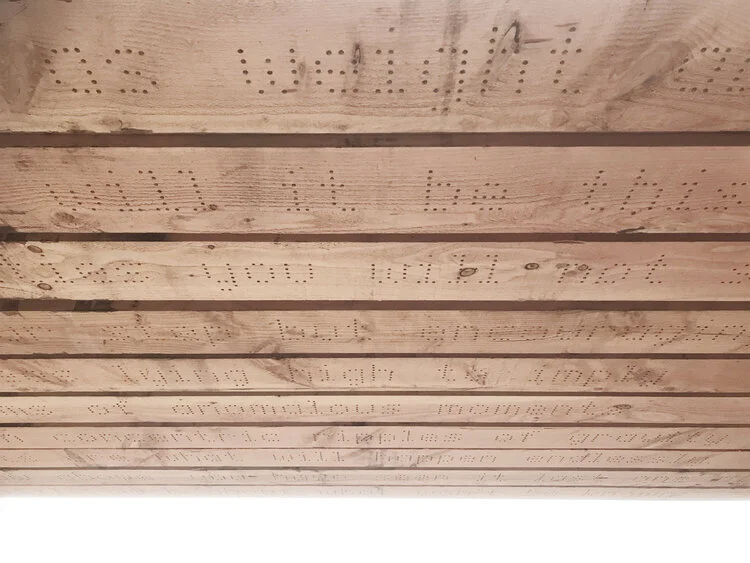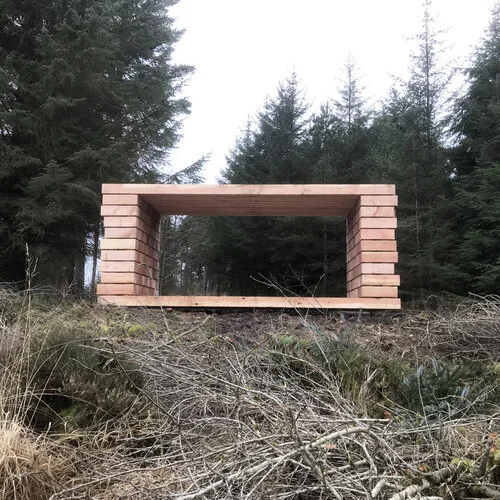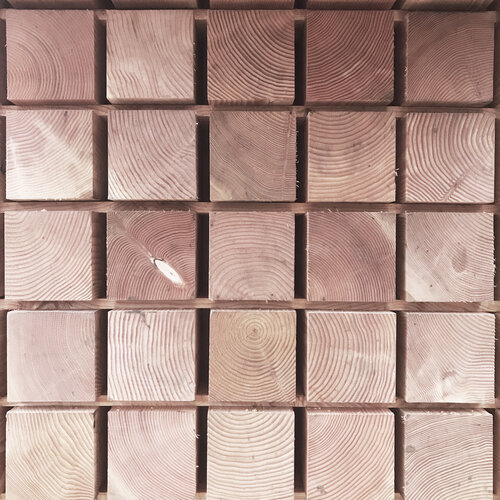Timelapse at Kielder Forest (2020)
Quite remarkable to have a duet of poems now nailed into David Rickard’s sculpture, Timelapse, on display in Kielder Forest, overlooking a Lake. David’s brilliant artwork will sit on permanent display and my poems, spelt out with copper nails, will alter in appearance as time ebbs. David was very generous to allow me to be part of this commission, it’s our third collaboration, and we spent a good year meeting and discussing the idea and project. I wrote a series of texts, poems, about time, fundamentally and with David’s help, they were revised and edited into a pair. One is above, as people walk into the sculpture, and one below, and they respond to that physical, material reality, as well as to each other. http://www.david-rickard.net/news.html Why not go to Kielder forest just to read my poems?
From the Kielder website kielderartandarchitecture.com/art-architecture/timelapse.html London-based sculptor David Rickard's new sculpture is now a feature of the Lakeside Way on the south side of the Bull Crag peninsula. 'Timelapse' is a structure that invites visitors to take in the view, and while there, ponder the slippery nature of time passing. In describing his proposal the artist says: 'The sculpture ‘Timelapse’ arrives from the underlying materials that define Kielder Water & Forest Park; timber and time. With trees typically growing in Kielder Forest for several decades before harvest the forest itself reflects various timespans through the scale of the trees in different plantations. This layering of time in the landscape is also present within the growth rings buried within the timber of individual trees. Once trees are felled, time continues to govern the production of timber as a period of seasoning or drying is required before it can be put to use. A process often fast-forwarded with kiln drying, but traditionally taking several months or even years with the wood carefully stacked to allow air circulation. As visitors approach the sculpture ‘time-lapse’ their first impression might be of a large stack of timber drying within the heart of the forest. Harvested at Kielder, this neat mass of timber embraces the materiality of the forest whilst also forming a minimal sculpture in juxtaposition to the surrrounding landscape.'
Jerwood Open Forest (2016)
An extraordinarily generous collaborative project I undertook with and for the artist David Rickard, as part of his shortlisted 'Returnings', for Jerwood Open Forest 2016. The project, an extended meditation on the forest, decay, material and language, included multiple developmental works, including an exhibition at Jerwood Space in Southwark London.
From Kathryn Lloyd: "David Rickard’s proposal for Jerwood Open Forest, Returnings, is a dialogue between artist, poet and forest. Taking apart an old structure on the verge of demolition, Rickard proposes to return the substantial elements to the forest — for the modified wooden pieces, packaged by man, to sit, again, amongst their untouched counterparts. Each piece of reclaimed timber is to be inscribed with a word taken from a commissioned piece of writing. The composite poem, written by SJ Fowler, was formulated on the basis of this framework — the amount of words determined by the amount of reclaimed wooden pieces. Introduced back into the forest in a sparse, mile-long, circular formation, the poetic trajectory becomes cyclical, always returning to itself, and inevitably culminating in a natural demise."
Kathryn Lloyd in conversation with David Rickard and SJ Fowler for Jerwood Arts Website : 03 / 01 / 17
Please read the full interview with David's insightful responses here http://www.jerwoodvisualarts.org/writing-and-media/returnings-kathryn-lloyd-conversation-david-rickard-sj-fowler/
KL: Steven, collaboration also seems to be a vital part of your practice. Would you be able to discuss this a little bit — in terms of what sort of role collaboration can play in poetry and performance?
SJ. Fowler: Collaboration is pivotal to me. So much to say here, but to cut to the quick, collaboration is not a method; it is human interaction, just with a creative goal as the excuse. Friendship, love, family — this is collaboration. I wish to spend my life in the company of people happily making things, being challenged by their intelligence and thoughts, being provoked into that which I wouldn’t have seen alone. It in no way eats into the solitary process — one so exclusively associated, bizarrely, with poetry, it often seems. In this specific case, with David’s gesture, to open his project up to a stranger, I took it be an extraordinary act of hospitality, of generosity, of humility, that he and I shared some essential methodological appreciation of collaboration, and so I felt responsible to really commit to the work, in all ways. It has proved to be a really brilliant time — all of it positive, a real highlight of my year.
KL: Steven, how did you approach writing with a framework like this in mind? I suppose in theory it’s a simple word count! But, did it feel different, creating a piece of writing to these specifications, for this purpose, knowing how it was going to be displayed?
SJF: I’m a big believer that mistaken notions that surround the creative process, within poetry specifically, but literature as whole, limit the medium’s growth into a truly contemporary form. This task was a perfect example of a few of these — how they appear to me exciting, or certainly the very thing I’m looking for, to grow as a poet and a human.
Prosaically there was, as you say, a word count limitation, but this is no more limiting than the thousands of constraints that hamper every piece of work, be it the poet’s language, their reading material, their mood, their method, etc. So in a way, this is a freeing limitation, a paradoxical emancipation, to have such a specific goal. I really love that. More profoundly, I felt I was responsible to David, to his work and vision, and the concepts so resonantly and eloquently present in his proposal and general practice. The notions of decay, material, presence, the geographical specificity, all this awareness, it cannot be separated from David’s way of making, of thinking. So I felt first responsible to that. This was the challenge really, to meet this expectation, but naturally self-imposed to a certain extent. Again, these challenges exist for all people, whether we set them on ourselves or they come from without, it is the same, and it’s so exciting. So I produced some text quite freely.
KL: Steven, I was wondering whether you had any thoughts about the role of authorship when the poem goes through this process?
SJF: I think this was one of threads in David’s thought which propelled me further in my writing and thinking around the project. The natural conclusion of this lack of maintenance is that the work dies. It rots away into that which it is about. Like us, though that’s heavy handed to say, but still to me, where my work is very often about death and its banality and how much we do to not think about it, a very powerful notion. It also negotiates David’s proposal through the problems many works have in being utopian, always seeking some sort of unlikely, physical legacy, beyond the life of the artist. This disappearance of the work, of my words, the poem being edited by the forest itself, as words fall away and new enjambments happen, is a sign of humility I think, of respect.
Resonance FM about Jerwood Open Forest - 25 / 11 / 16
A lovely chat on Resonance FM about the Jerwood Open Forest exhibition which runs until December 11th https://www.mixcloud.com/Resonance/clear-spot-jerwood-open-forest-18th-november-2016/
Jerwood Open Forest exhibition opening at Jerwood Space - 01 / 11 / 16
A privilege to be part of the 2016 Jerwood Open Forest Exhibition at the Jerwood Space in London, thanks to my collaborator, David Rickard, and the staff at Jerwood, who have all been exceptionally generous in supporting my work.
David was shortlisted earlier this year for the project and invited me then to work with him in producing new texts for his proposal, and as the process of the project moves towards the award being granted, the Jerwood Space hosts an exhibition with representations of the works being proposed by each artist. David created a wholly new work for the exhibition, conceptually connected to the Returnings idea, that saw him source an out of commission memorial bench and gently dissect it into its constituent parts. I then wrote a poem / text responding to this work, a word for each piece of the exhibited bench skeleton. My words are beautifully projected in the gallery against a wall, becoming a kinetic poem, the entire text on loop, revealed over exactly three minutes.
The launch event was lovely, so great to spend time in that space, meet the other artists, and see my work exhibited in a gallery I often visit and admire. David and I also had a chance to appear on Resonance FM talking about our work on the day of the opening. A wonderful collaboration that I hope spawns lots more work with David in the near future.
Open Forest exhibition at Jerwood Visual Arts November 2nd to December 11th
171 Union Street. Bankside. SE1 0LN / http://www.jerwoodvisualarts.org/exhibitions/jerwood-open-forest/
Gallery hours: Monday – Friday 10am – 5pm / Saturday & Sunday 10am – 3pm
I'm pleased to have a newly commissioned piece of text responding to, and collaborating with, the work of artist David Rickard on exhibition at Jerwood Visual Arts as part of their remarkable Open Forest project. The work explores the notion of dissection, the breaking down of things into their component parts and the fragmentation of recollection, all expressed by way of a deconstructed memorial bench. The installation is part of a wider work entitled Returnings
The Jerwood Open Forest exhibition brings together the work of David Rickard and the four other shortlisted artists for 2016, with new bodies of work spanning installation, film, ceramics and performance on display.
Collaborating with David Rickard for Returnings: a beginning dialogue - 01 / 09 / 16
Over the last few months I've had the opportunity and pleasure to work with the artist David Rickard, in quite an inspiring context. David, whose remarkable career as artist has been marked by a particularly complex and deft relationship to space, object, architecture and process, has been shortlisted for the Jerwood Open Forest scheme.
After being shortlisted for his idea David, very generously, began a conversation about how poetry might find a place in his idea. His proposal was to engage with Fielder Forest in Northumberland and create a trail throughout unmarked woods. The rail would be made of a reclaimed house or building, stripped and dissembled into the very rawest wood of a structure, bare planks, and on each of these planks, following a carefully selected route, would be inscribed one word. This trail would then be read as it is followed, neither a narrative, or a poem, or a story, but all of these. And then, vitally, the trail and its posts would rot, become once again the forest, and so my words would be edited by the very forest itself.
From the Jerwood Open Forest blog, David wrote: "Returnings: 29 Jul 2016 - So far my search for a forest has been headed simultaneously in two very different directions. Firstly, for a growing, photosynthesising cluster of trees, a forest in the current tense and secondly for a building with timber bones, a forest in the past sense. Eventually these two will come together, but for now they are poles apart. The living forest will be a plantation, established and grown for the eventual yield of its timber and Kielder Forest has been identified as the prime candidate – an expanse of 600 square kilometres of forest stretching across the northern half of Northumberland.
In parallel there have been conversations with demolition contractors, with names like Titan and Redhammer, and the hunt is on to establish how we can find a suitable building that will form the fabric of the installation. It will be a timber structure that has come to the end of its functional life and is ready for a return trip to its place of origin.
Carved into the surfaces of the beams and boards will be words. One word on each piece, which together form an expansive poem with no beginning or ending; a meandering narrative that flows through the circuitous journey that the timber has taken. The voice of these words will be S J Fowler, a contemporary English poet that has agreed to collaborate on the creation of ‘Returnings’. Now there are fragments; a forest, a hunt for a building and words. There’s still a lot to do before these fragments combine to form a work."


